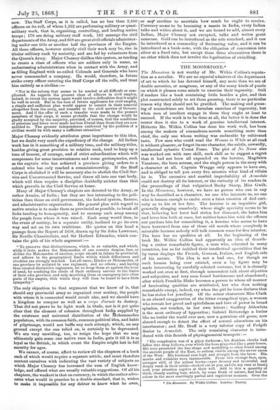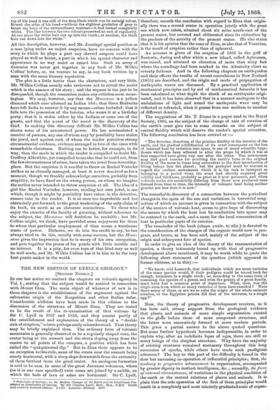THE MOONSTONE.* The Moonstone is not worthy of Mr. Wilkie
Collins'a reputa- tion as a novelist. We are no especial admirers of the department of art to which he has devoted himself, any more than we are of double acrostics, or anagrams, or any of the many kinds of puzzle on which it pleases some minds to exercise their ingenuity. Still if readers like a book containing little besides a plot, and that plot constructed solely to set them guessing, there is no particular reason why they should not be gratified. The making and guess- ing of conundrums are both harmless exercises of ingenuity, but when men of intellect engage in them they ought at least to succeed. If the work is to be done at all, the better it is done the nearer does it rise to a work of genuine intellectual interest. Hitherto Mr. Wilkie Collins has done his work well, has been among the makers of conundrum-novels something more than chief, the only one whose writing was endurable by cultivated taste. Few men who could read the Woman in White at all read it without pleasure, or forgot its one character, the subtle, cowardly, intellectual sybarite Count Fosco. The plot of No Name also was worked out with rare skill, such skill as to suggest a regret. that it had not been all expended on the heroiue, Magdalen Vanstone, the born actress, and the single person in the story with a character at all. Captain Wragge only appears to have one, and is obliged to tell you every five minutes what kind of villain he is. The excessive and morbid improbability of Armadale could not destroy all its interest, or the curiosity of its readers in the proceedings of that vulgarized Becky Sharp, Miss Gwilt.
In the MoOnstone, however, we have no person who can in any way be described as a character, no one who interests us, no one who is human enough to excite even a faint emotion of dull curi- osity as to his or her fate. The heroine is an impulsive girl, generally slanging somebody, whose single specialty seems to be that, believing her lover had stolen her diamond, she hates him and loves him both at once, but neither taxes him with the offence nor pardons him for committing it, a heroine who seems to have been borrowed from one of those old novels where everybody is miserable because nobody will talk common sense for five minutes.
The hero has no qualities at all. In the beginning of the book Mr. Wilkie Collins had apparently an idea of describ- ing a rather remarkable figure, a man who, educated in many countries, has so far imbibed their intellectual specialities that be
by turns displays the French, German, Italian, and English side
of his nature. The idea is not a bad one, for though no such human being ever existed, even a lay figure may be made interesting by carefully selected costume, but it is clumsily worked out even at first, through nonsensical talk about objective and subjective, and very soon found burdensome and abandoned ; after which Franklin Blake becomes a person to whom all manner of fascinating qualities are attributed, but who does nothing remarkable except, indeed, cry when the girl he loves declares that he has stolen her jewellery. Of the minor characters Miss Clark is an absurd exaggeration of the bitter evangelical type, a woman who reveals her greed and spitefulness and love of power in broad splashes, not touches, in her own letters ; Godfrey Ablewhite is the most ordinary of hypocrites ; Gabriel Betteredge a butler like no butler the world ever saw, now a garrulous old goose, now shrewd enough to detect the effect of several educations on his interlocutor ; and Mr. Bruff is a very inferior copy of Pedgift Senior iu Armadale. The only remaining character is intro- duced with this flourish of physiognomies! trumpets :—
" His complexion was of a gipsy darkness ; his fleshless cheeks had fallen into deep hollows, over which the bone projected like a pent-house- His nose presented the fine shape and modelling so often found among the ancient people of the East, so seldom visible among the newer races. of the West. His forehead rose high and straight from the brow. His. marks and wrinkles were innumerable. From this strange face, eyes, stranger still, of the softest brown—eyes dreamy and mournful, and deeply sunk in their orbits—looked out at you, and (in my case at least) took your attention captive at their will. Add to this a quantity of thick, closely curling hair, which, by some freak of nature, had lost its colour in the most startlingly partial and capricious manner. Over the • The Moonstone. By Wilkie Collins. London : Tinsley.
top of his bead it was still of the deep black which was its natural colour. Round the sides of his head—without the slightest gradation of grey to freak the force of the extraordinary contrast—it had turned completely white. The line between the two colours preserved no sort of regularity. At one place the white hair ran up into the black ; at another, the black hair ran down into the white."
All this description, however, and Mr. Jennings' special position as
a man lying under an unjust suspicion, have no concern with the story in which he plays a part any shrewd surgeon could have played as well or better, a part in which his special character and appearance in no way assist or retard him. Such an array of dummies was never got together in any book of Mr. Wilkie
Collins' before, or, we venture to say, in any book written by a man with the same literary reputation.
The plot is a little better than the characters, and very little. Mr. Wilkie Collins usually asks reviewers not to reveal the secret -which is the essence of his story ; and the request is too just to be disregarded, though the concession makes any criticism seem mean- ingless. We may, however, say that the Moonstone is a yellow diamond which once adorned an Indian idol ; that three Brahmins have left India to recover it by any means—crime included; that it -falls into the possession of the heroine, who wears it at a birthday
party ; that it is stolen either by the Indians or some one of the guests, and that the secret of the novel is the discovery of the thief. In making this discovery difficult Mr. Wilkie Collins has :shown some of his accustomed power. He has accumulated a number of persons, any one of whom may by possibility have stolen the jewel, and against each of whom the reader perceives strong -circumstantial evidence, evidence arranged in two of the cases with remarkable cleverness. Nothing can be better, for example, in its -way, than the mode in which the reader is compelled to doubt Mr.
'Godfrey Ablewhite, yet compelled to see also that he could not, from the few circumstances of crime, have taken the jewel from itsresting- place. But the suspicion it is needful to throw on Rachel Verinder -strikes us as clumsily managed, at least it never deceived us for a moment, though we frankly acknowledge ourselves, probably from stupidity, to have fixed on the wrong person, on whom we imagine the author never intended to throw suspicion at all. The idea of a girl like Rachel Verinder, however, stealing her own jewel, is one which, though it might by possibility have taken in the detective, -cannot take in the reader. It is at once too improbable and too 'obtrusively put forward, to the great weakening of the only claim of its book, its merit as an elaborate conundrum. To those who
-enjoy the exercise of the faculty of guessing, without reference to the subject, the Moonstone will doubtless be readable ; but Mr. Collins might, we think, have provided some enjoyment for those to whom that particular employment of time seems a wearisome waste of power. Hitherto, we do him the credit to say, he has always tried to do this, usually with some success, but the Moon- -stone gives the impression that he is weary of his own occupation, and puts together the pieces of his puzzle with little trouble and am interest. It is a pity, for even toys of that kind may as well
be well made, and Mr. Wilkie Collins has it in him to be the very best puzzle-maker in the world.































 Previous page
Previous page